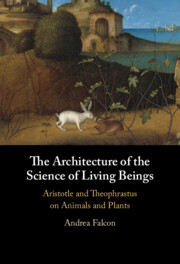Acknowledgments
My interest in the structure of the Peripatetic science of living beings dates back to my research on the scope and organization of Aristotle’s science of nature. The main results of that research are published in Falcon 2005. My first introduction to Aristotle’s study of animals was a memorable seminar jointly offered by David Charles, James G. Lennox, and Allan Gotthelf at the University of Oxford in Trinity Term 1994. The seminar, which was entitled “Philosophical Issues in Aristotle’s Biology,” left a lasting impression on me and a desire to know more about “Aristotle’s biology.” A visiting appointment in the Department of Classics at the University of Pittsburgh in the fall of 2008 marked a decisive turning point in the genesis of this book. That appointment gave me the opportunity to return to Aristotle’s works on animals and reflect on their philosophical and historical significance. The fall of 2008 was also the beginning of a rewarding collaboration with Allan Gotthelf, who at the time was a multi-year visiting professor in the Department of History and Philosophy of Science at the University of Pittsburgh. My intellectual debts to him are most obvious in Chapters 3 and 4. Chapter 3 reuses results presented in Gotthelf-Falcon 2017 and Falcon 2021a. The thesis I defend in this book is presented in a nutshell in Falcon 2015 and Falcon 2020. The first of these essays was extensively discussed with Allan Gotthelf. At a time when his health was deteriorating rapidly, Allan gave his expert feedback on the question that is at the very heart of this book, namely whether there is a unified study of living beings in addition to separate studies of animals and plants in the explanatory project that we call Aristotle’s natural philosophy. I remember our exchange of ideas with great fondness and with the sadness that comes from the realization that there can be no more.
The final version of the book was written in the summer semester of 2023 when I was visiting the University of Tübingen as a full-time member of the TIDA (“Text and Idea of Aristotle’s Science of Living Beings”) research team. In his capacity as principal investigator of TIDA, Klaus Corcilius organized a research workshop on the book manuscript on April 17–18, 2023. I would like to register here my heartfelt gratitude to him and to the commentators who kindly agreed to give me their expert feedback on the penultimate version of the book: Robert Roreitner (Chapter 1), Philip van der Eijk (Chapter 2), Lucas Angioni (Chapter 3), Jochen Althoff (Chapter 4), Maximilian Haars (Chapter 5), and Klaus Corcilius (Chapter 6).
Three expert readers chosen by Cambridge University Press were part of the anonymous peer-review process. I have done my best to take their comments and suggestions for improvement on board. While they may not agree with all I say, I hope they will see that the book is much improved thanks to their reports.
I wrote a first draft of the book while I was away from teaching in the winter of 2020. I thank Concordia University, Montreal, for granting me sabbatical leave to complete this task. I also take this opportunity to express my gratitude to my former school for all the support and freedom given to me over the years. Without that support and freedom, this project would not have been possible in the first place.
The book is being published in golden open science with the generous support of the European Union (European Research Council, TIDA, grant agreement no. 101053296). The views and opinions expressed in the book are mine and do not necessarily reflect those of the European Union or of the European Research Council Executive Agency. Neither the European Union nor the granting authority can be held responsible for them.

